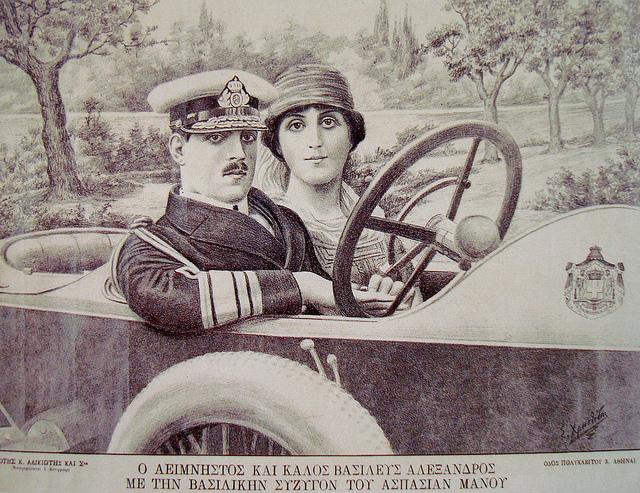 |
| Queen Sophia of Greece with her granddaughter Alexandra, April 1921. |
On 25 March 1921, Aspasia Manos gave birth to a daughter at Athens. The infant was named Alexandra. Her father, the late King Alexander I of the Hellenes, had died on 25 October 1920.
 |
| A lithograph of King Alexander I of the Hellenes and Aspasia Manos, circa 1918. |
In 1915, Prince Alexander of Greece, son of King Constantine I of the Hellenes and his wife Queen Sophia (born Princess of Prussia), met Aspasia Manos, daughter of Colonel Petros Manos and his first wife Maria Argyropoulos. After a time, the couple became secretly engaged. This was necessary owing to the fact that the Greek royal family expected its members to marry other royals: this was a check mark that Mademoiselle Manos did not tick. In 1917, Alexander was compelled to become the King of the Hellenes after his father King Constantine was forced off the throne and his older brother Crown Prince George was not considered malleable by the then Greek government. Save for the new king, the entire Greek royal family was forced to go into exile. Aspasia was Alexander's sole support on the home front. The couple secretly married on 17 November 1919.
 |
| Aspasia Manos and King Alexander I of the Hellenes. Photograph (c) Alamy. |
Alexander and Aspasia were just shy of marking their first wedding anniversary when the king died as the result of a tragic accident. Aspasia was four months pregnant when her husband passed away. Five months after Alexander's death, Aspasia gave birth to their only child, who was named Alexandra in honour of her father. Alexandra's grandfather King Constantine I and her great-grandmother Queen Dowager Olga served as her godfather and godmother. In July 1922, Alexandra was retroactively recognised as Her Royal Highness Princess Alexandra of Greece and Denmark, albeit with the caveat that she was not to be considered a Greek dynast. In September 1922, Alexandra's mother Aspasia was also given the style and title Her Royal Highness Princess Aspasia of Greece and Denmark.
 |
| Princess Aspasia and her daughter Princess Alexandra. |
After the overthrow of monarchy in 1924, Princess Aspasia and her daughter Alexandra followed the royal family into exile. For a period, mother and daughter lived in Fiesole, Italy, with Alexandra's grandmother Queen Dowager Sophia, who was very fond of her granddaughter. In 1927, Aspasia and Alexandra briefly relocated to the United Kingdom, and then returned to Italy after Aspasia purchased the villa The Garden of Eden in Venice. Aspasia and Alexandra remained in Venice until the outbreak of the Greco-Italian War in 1940, which necessitated the princesses leaving Fascist Italy, the enemy of their homeland. After periods in Egypt and South Africa, Aspasia and Alexandra moved to the United Kingdom.
 |
| King Peter II and Queen Alexandra of Yugoslavia with their son Crown Prince Alexander. |
In 1942, Princess Alexandra of Greece and Denmark met King Peter II of Yugoslavia in London. Two years later, the couple were married in the British capital with King George VI and Queen Elizabeth as guests. In 1945, King Peter and Queen Alexandra of Yugoslavia welcomed the arrival of their only child, Crown Prince Alexander.
 |
| The last King and Queen of Yugoslavia, Paris, 1967. |
King Peter II of Yugoslavia died in 1970, aged only forty-seven. For much of her life, Queen Alexandra of Yugoslavia suffered from mental health difficulties; she was ably looked after by her mother Princess Aspasia, who passed away in 1972. Queen Alexandra of Yugoslavia's health remained precarious. She spent her later years in a British nursing home. On 30 January 1993, Queen Alexandra of Yugoslavia passed away at Burgess Hill, West Sussex. Alexandra was seventy-one years-old. The queen was survived by her son Crown Prince Alexander of Serbia and her three grandsons.
As we conclude this journey through the life of Princess Alexandra of Greece, we are reminded of the resilience and adaptability that defined her existence. Born in 1924, Princess Alexandra's life was marked by turmoil and upheaval, as her family's monarchy was overthrown, leading to a life of exile and displacement. Her early years were spent in Italy, where she lived with her mother, Princess Aspasia, and her grandmother, Queen Dowager Sophia. The family's journey took them to the United Kingdom and eventually to the United States, where Princess Alexandra grew up amidst the backdrop of war and the decline of European monarchies. Her marriage to King Peter II of Yugoslavia, which ended tragically with his death, led to her becoming the queen of Yugoslavia, a role she filled until the monarchy's eventual abolition.
As we reflect on Princess Alexandra's life, we are struck by her unwavering dedication to her family and her heritage. Despite the challenges she faced, Princess Alexandra remained steadfast in her commitment to her royal duties and her role as a symbol of hope for her people. Her legacy serves as a testament to the enduring power of family and tradition, and we are honored to have shared her story with you. We hope that this article has provided a meaningful glimpse into the life of Princess Alexandra of Greece, a true icon of European royalty. As we bid farewell to this remarkable woman, we are reminded of the importance of preserving our collective history and honoring the memories of those who have shaped our world. May Princess Alexandra's story continue to inspire future generations, and may her memory remain forever etched in our collective consciousness.



No comments:
Post a Comment